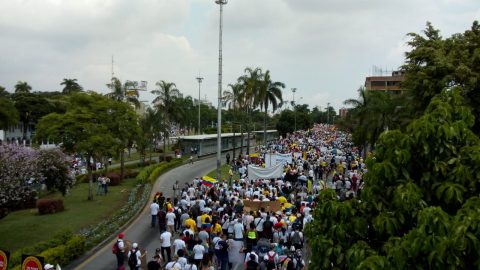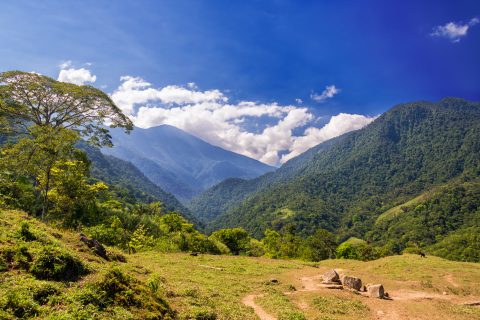Colombia protests point to challenges ahead for forest protection
The ongoing social unrest now engulfing Colombia is an indicator of the perils of rising poverty and inequality confronting Latin America and much of the developing world. For advocates of forest protection and sustainable development, the protests and subsequent violence are also a troubling sign of the challenges ahead.
Addressing the economic and social conditions fueling the protests is key to forging a peaceful path forward for Colombia and to meeting our global climate goals.
“The priority for public spending is the health crisis… This is affecting the implementation of public policies in sectors like rural development, agriculture and the environment,” says EII Colombia Coordinator María Adelaida Fernández Muñoz, summarizing the results of an informal survey of regional partners EII conducted last year on the impacts of the COVID 19 pandemic.
She continued, “Deforestation is increasing in areas where pressures for deforestation existed before COVID-19… With command-and-control capacities diminished, illegal actors are increasing their control over the territory and forcing local communities to clear more forest and plant illicit crops, which offer a secure source of income for the poorest communities in the region.”
EII Research Associate Magda Rojas Peña lives in Florencia, the capital of Caquetá, where she says road closures have led to shortages of food, propane, and other necessities. “There is only one road into Florencia,” she explains, “and other municipalities rely on Florencia for goods. It is very difficult in this moment.”
Pointing to the economic malaise affecting the country, she agrees that forest protection and development strategies will likely take a back seat to more immediate pressures. “Local officials won’t see this as a priority as long as people don’t have food or gas to cook with.”

Since the onset of the pandemic, economic conditions in Colombia have continued to deteriorate. The country recorded a 6.8% drop in GDP in 2020—the largest decline in half a century—while unemployment stands at 14% and over 40% of the population is now living in poverty. The coronavirus, meanwhile, continues its deadly rampage, with daily deaths per capita among the highest in the world.
These grim figures provide the backdrop to the past week’s outbreak of violence that has claimed 24 lives to date, with many more reported injured or missing. Fueled by proposed legislation to reform the nation’s tax code, the move—later revoked—was part of an attempt by the central government to close the gaping fiscal hole opened by the pandemic. Many saw it as an attempt to put the burden of economic recovery on the backs of the nation’s poor and middle class.
But the figures also point to the likelihood of increased pressure on Colombia’s forests—among the world’s most biodiverse and key to the Amazon’s future—as newly unemployed and rural poor turn to forests for subsistence and economic livelihood. Current conditions are almost certain to complicate Colombia’s ambitious pledge to achieve net-zero deforestation by 2030.
EII has been working since 2013 to implement low-emission rural development (LED-R) strategies in the Amazon departments of Caquetá and Putumayo, regions with some of the highest rates of both poverty and forest loss in the country, according to data from EII's Green Jurisdictions Database.
As part of these efforts, EII’s Colombia team recently celebrated the launch of the Caquetá Sustentable platform, aligning the region’s stakeholders behind a shared set of sustainability goals. In addition, EII worked closely with a local coalition of partners including Colombia’s Fund for Agricultural Sector Finance (FINAGRO)—supported by funding from the governments of Norway, Germany and the United Kingdom—on the development of a new line of credit to enhance sustainability among Colombia’s small-scale ranchers.
These are modest but necessary steps to alleviate conditions of poverty driving much of the current unrest and to ensure Colombia’s forests remain standing. “These projects offer hope, and a vision of the future,” explains Rojas, noting that if even just a few families benefit the results can “help motivate residents and turn the tide away from despair.”
More is certainly needed. “There is a critical need to generate new economic opportunities,” Fernández concluded, pointing to the potential of online platforms like the Feira SISA platform in the Brazilian State of Acre as a means of boosting local incomes and enhancing regional trade and consumption of sustainable products.
Longer term, however, she says international cooperation “will be essential.”

Such cooperation could come through the newly announced LEAF (Lowering Emissions by Accelerating Forest Finance) initiative, presented at the close of the recent Climate Summit in Washington DC. Hailed as a breakthrough in delivering long-awaited international climate finance to developing nations, payments from the $1 billion plan would likely not be disbursed for up to several years.
As EII Executive Director Daniel Nepstad recently noted in an article in Mongabay, “the political appetite in tropical forest states and nations to invest heavily in reducing deforestation today for payments that may begin in years” will be limited, particularly given current economic conditions.
Or, as William Boyd of UCLA’s Institute on Environment and Sustainability puts it, such funding cannot be limited solely to “high performing jurisdictions” that have the capacity to meet donor’s rigorous standards. “It is critical that such support… be directed to and tailored in a manner that meets governments and their civil society partners where they are,” Boyd insists.
As we approach COP 26 attention on tropical forests and their role in mitigating the effects of climate change is growing. With that attention has come new opportunities to turn the corner on the continued loss of this vital resource.
But as events in Colombia suggest, the fate of the world’s tropical forests—and the ability of governments to protect them—is deeply intertwined with the economic stability and prosperity of tropical forest regions, regions like Caquetá and Putumayo, where opportunity is scarce, and forests abound.
Strategies that do not address this fundamental reality are likely to fall short, leaving forests and our climate to the swirling winds of anger and frustration now sweeping across Colombia.


